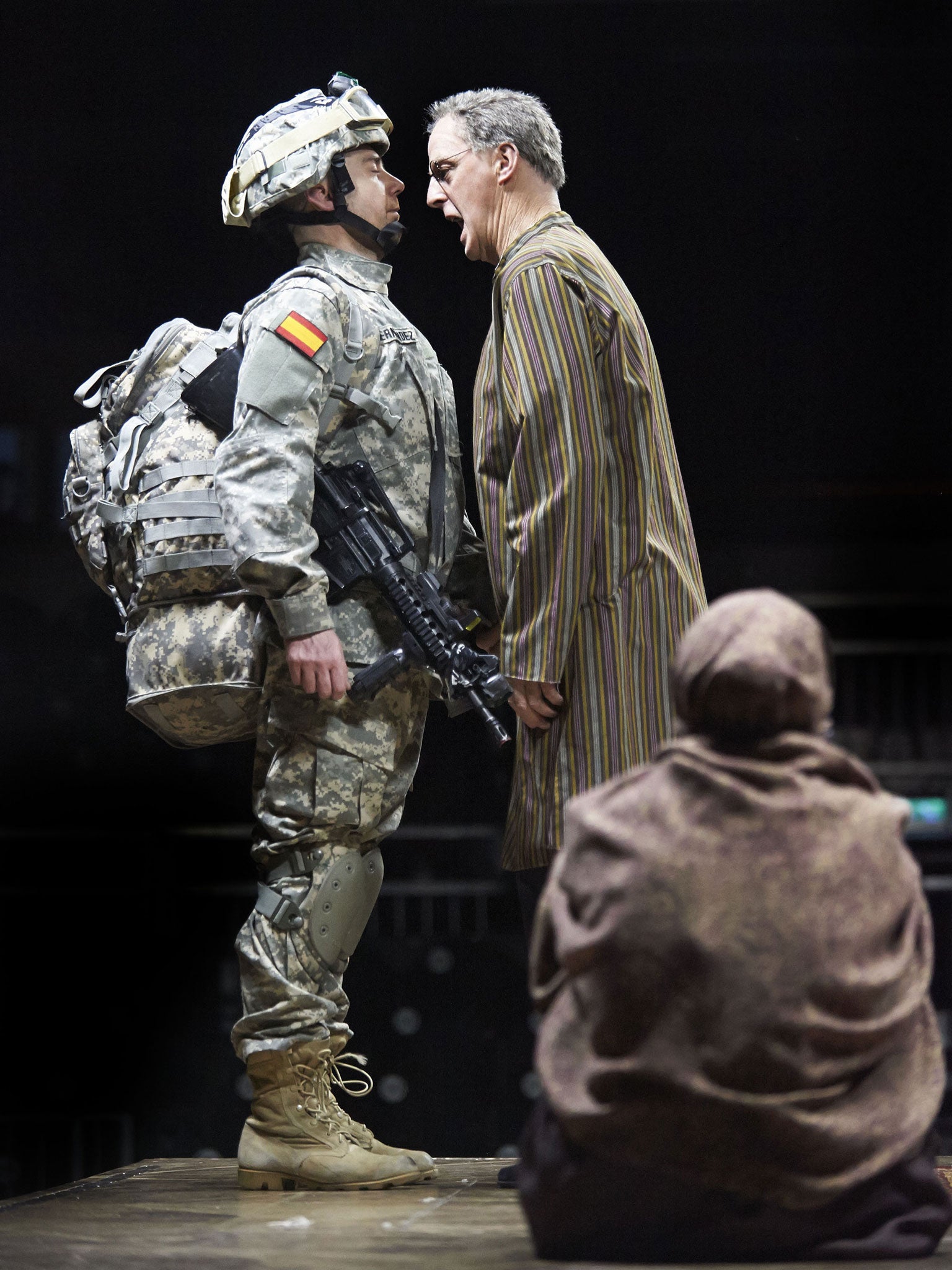Theatre review: Playing Cards 1: Spades - The Devil came down to Nevada
Strange drama in a Las Vegas casino misses the jackpot, but its black humour lingers in the mind

Acompulsive gambler in a business suit, wanting to end it all, checks out of a Las Vegas casino-hotel and wanders into the desert, casting off his clothes as he staggers on under the burning sun. The circular stage spins under his feet, as if the Earth were a giant roulette wheel.
The set is, surely, meant to be the star of Playing Cards 1: Spades, Robert Lepage's latest production and the first instalment of a planned tetralogy. The Québécois director-deviser's company, Ex Machina, is famous for stunning stage mechanics, and Spades is a pioneering commission for an international network of in-the-round venues.
As Lepage's multiplying (and polyglot) characters cross paths in the casino-hotel – drawn into Sin City's underworld of sleazy sex and avarice – the stage floor doesn't only revolve. It's also a kind of flat-pack maze. Concealed doors flip up and hatches fold away to reveal steaming hot-tubs or sunken late-night bars, where bottles of spirits glow in the dark. All entrances and exits are through these traps.
A showgirl, moonlighting as a prostitute, slinks and winks, as well as appearing to have a sweet side. Ultimately, she is lured into the bedroom of a squaddie who, having been sexually abused at a nearby Iraq-war training camp, has gone Awol, and imagines he's been reincarnated as a medieval crusader against evil.
Meanwhile, an arid physicist has been lured into a gaming spree, though he knows the odds. A predatory card shark and conjuror in cowboy gear – possibly the Devil incarnate – is spiking drinks. Popping up everywhere, he seduces the scientist's naïve wife and dogs the footsteps of the suicidal executive.
However, the hard truth is that, compared with Lepage's past wonders, Spades disappoints, at times falling surprisingly flat. The phrase "busted flush" springs to mind, but hopefully this is an epic-in-progress that will benefit from adjustments.
The script needs further development, and the fiendishly complex, 360-degree staging was still rough around the edges at its London press night. Arms could be seen shooting up to catch the pop-up doors as they swung shut, and the revolve clumsily exposed what should have been cunning theatrical illusions.
Still, several of the actors are spellbinding, notably Nuria Garcia as the sinuous hooker, and Tony Guilfoyle who doubles as the tense exec and the soldier's vile, insinuating commander. In spite of flaws, Spades lingers in the mind for its menacing black humour and mythological dimension – good angels and demons battling for souls.
Director/deviser Tristan Sharps' often brilliant immersive theatre company Dreamthinkspeak has also bitten off more than it can chew. In the Beginning Was the End (Somerset House, London ****)was first inspired by the Book of Revelation and Leonardo da Vinci – both his hydraulic inventions and his worries about the potential misuse of science.
This promenade piece is site-responsive as well, leading you through King's College London's maze of subterranean tunnels and spiralling steps, through cubbyholes and high Neoclassical chambers. Many of the installations, en route, are droll and ominous, including a throbbing laboratory – caught somewhere between the 1970s and the surreal – where white-coated eggheads whisper in foreign languages, waving electrodes amid banks of flickering dials.
But the piece seems to lose its way – or shallow out – as we step into the HQ of a fictional, up-to-the-minute, white-walled corporation that markets gadgets. Their mini-robots are supposed to make us cups of tea or fling foam discs at kitchen mice, only their motors are a tad out of control. That, in turn, leads to computer screens flashing up consumer complaints. Boardroom tables tilt to become death chutes as shares drop, and harassed office underlings run amok, stripping naked.
In the Beginning ... lacks a strong storyline, yet it's worth the wait for the moment of celestial transcendence when the free spirits, unclothed and now calm, process up a winding stairwell and lean out, high above you, like hesitant archangels. I look forward to further collaborative projects by Somerset House and King's Cultural Institute, the college's new creative initiative.
Coincidentally, the idea that technological advances might not always benefit humanity is crisply articulated by the titular protagonist in Brecht's A Life of Galileo (Swan, Stratford-Upon-Avon ***). This fine biodrama, of course, sees the revolutionary astronomer and physicist vehemently defending the quest for scientific knowledge, confuting the Catholic Inquisition's doctrine that everything revolves round the Earth.
Mark Ravenhill's new translation for the RSC, cutting some historic detailing, is less verbose than the original. Roxana Silbert slightly overeggs her production's hi jinx, but designer Tom Scutt's fusions of 17th-century and modern dress sharply emphasise the persistent topicality of rationalism versus religious fundamentalism, and of academic researchers pressured to fit their results to funding bodies' agendas. Ian McDiarmid's Galileo is a feisty dynamo: gung-ho, then pale and broken by interrogation, but ultimately a wily survivor.
'Spades' (0844 482 8008) to 2 Mar; 'A Life of Galileo' (0844-800 1110) to 20 Mar; 'In the Beginning Was the End' (020-7452 3000) to 30 Mar
Critic's Choice
At London's Young Vic (to 2 Mar), Feast whirls through Yoruba cultural history, from the slave trade to today’s diaspora, with a dazzling fusion of short plays, dance and wizard projections. For children, The Icebook is a magical fantasy played out in a miniature theatre with delicate paper cut-outs. Aimed at aged 10 and over, it’s in Stratford-upon-Avon’s Swan Theatre building (Mon to Sat).
Join our commenting forum
Join thought-provoking conversations, follow other Independent readers and see their replies
Comments
Bookmark popover
Removed from bookmarks